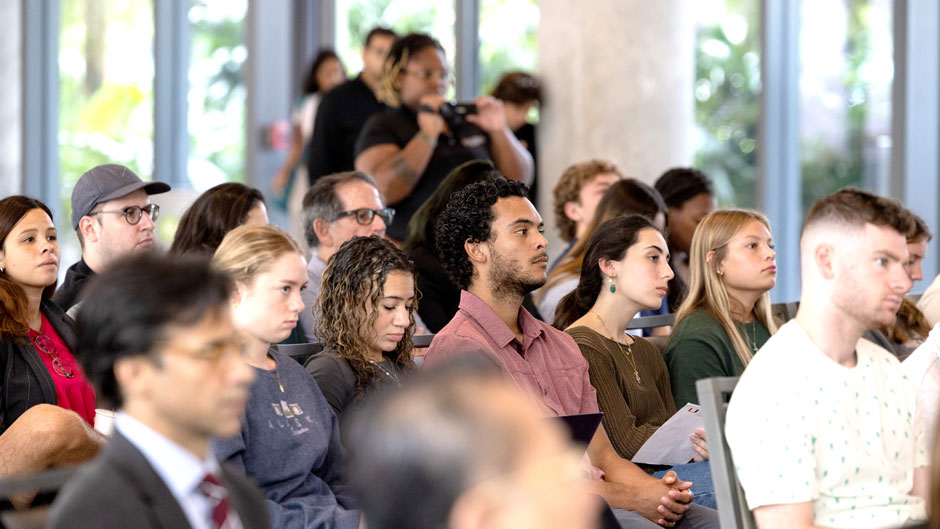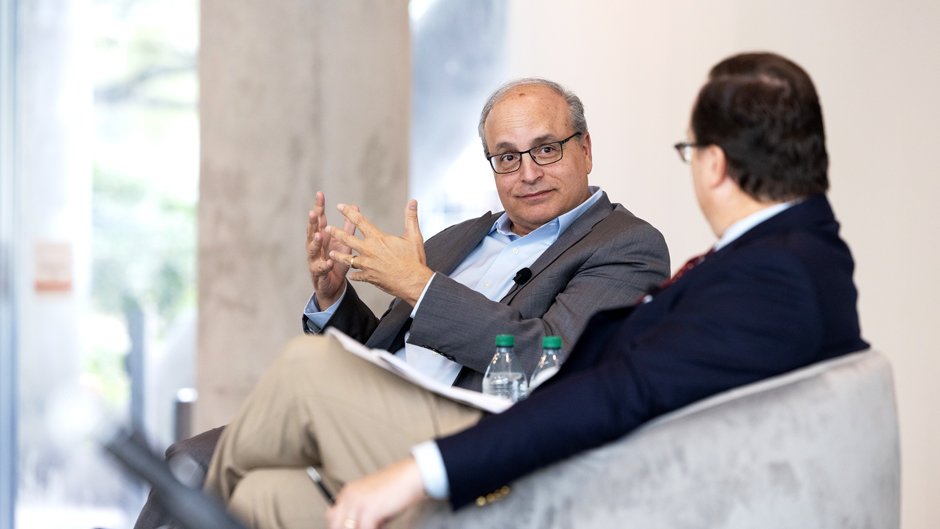Latin America, not unlike the United States, is experiencing an erosion of democratic values.
That was the core message that Francisco O. Mora, U.S. ambassador to the Organization of American States, brought to an event “U.S. Relations with Latin America: A Conversation with Francisco O. Mora,” that took place on Thursday at Lakeside Village Expo Hall. Sponsored by the George P. Hanley Democracy Center, the talk drew more than 100 students, faculty and staff members, and the public.
Willy Prado, interim executive vice president and provost, and Gregory Koger, professor of political science and director of the Hanley Democracy Center, welcomed Mora, a double alumnus who grew up in Miami and received his Ph.D in International Affairs and an M.A. in Inter-American Studies from the University of Miami.
“He is an exceptional leader and someone we should aspire to be like,” said Prado.
Mora represents the United States at the OAS, an organization established in order to achieve among its member states “an order of peace and justice, to promote their solidarity, to strengthen their collaboration, and to defend their sovereignty, their territorial integrity, and their independence.” He was sworn into office on Dec. 30, 2022.
“Our number one priority—and the one I have to work on day in and day out—is democracy in the Americas,” he said. “The numbers are a little scary.”
He noted that in the latest survey by AmericasBarometer, the scariest number given was when Latin Americans were asked the question: “What is your level of faith in democracy?” Only about 48 percent of those surveyed expressed a positive view of democracy. He said that 10 to 12 years ago, 60 percent would hold a favorable view of democracy.

“There is a 15 percent decline on how people view democracy in the region,” Mora said. “The trend lines are not good and that is a threat to our national security.”
He said this trend shows that people are “disaffected and discontented with the quality of democracy.” He added that this could have repercussions to the “rise of populism” and anti-democratic forces in the region.
The OAS has been working diligently to respond to these trends and support democracy, he said. It is in the interest of the U.S. and other countries to uphold democracy because, although not perfect, it is the optimal political system to “promote prosperity, stability, and growth and development for countries around the world.”
Koger asked Mora about some of the major issues that the OAS is tackling. Mora discussed some of the issues concerning different countries across the hemisphere.
Guatemala
Guatemala held a run-off election in August where the majority of the voters chose Bernardo Arevalo, of the Seed Movement Party, as its president-elect. Arevalo won by 20 points.
There have been “anti-democracy” forces that have been trying to prevent him from assuming the presidency, Mora said. The OAS is helping to prevent prosecutors who want to use the legal system to “politically prosecute” Arevalo and other candidates who they view as a threat to the status quo, he said. The OAS has passed resolutions and has sent a delegation to Guatemala supporting the free elections and to make sure that the president-elect can assume power in January, he said.
Haiti
The OAS has been working to introduce a security force to bring stability to that country, Mora said. Gangs control many segments of Haiti with violence that includes kidnappings, rapes, and murders. The United Nations Security Council is working toward a resolution in support of a multinational police force to go to that country, he said. It will be led by Kenya with 1,000 police members. The U.S. will support that mission and will provide $200 million to that effort, he said.
Influence of Russia and China in Latin America
Mora said that when the Chinese come to invest in Latin America, “their priority is not democracy.” The Chinese are interested in the return on their investment and economic trade, but they also exert political influence, he said.
“We don’t see them as a threat but as a competitor,” he said. He said there are ways the private sector can compete against the Chinese. One way is to better promote the value of U.S. higher education.
“Everyone wants to study at U.S. universities,” he said. “How do we bring more Latin American students to study at the University of Miami? That is a long term investment.”
Despite the growth of Chinese investment in Latin America, the largest investor in the region continues to be the United States, he said.
Venezuela and Cuba
He said that although Cuba and Venezuela have authoritarian governments, the OAS must never forget what is happening in those two countries.
“The people of Cuba and Venezuela have the same rights and deserve to be heard, and we should be calling attention to the human rights violations in those countries,” he said.
He highlighted that the Inter-American Commission on Human Rights—which is an arm of the OAS—recently published a report that detailed the death of Cuban human rights defender and political leader Oswaldo Payá and fellow human rights defender and dissident Harold Cepero. They were subjected to various acts of violence, harassment, threats, and attempted murder. Both were killed in a car crash on June 22, 2012.

